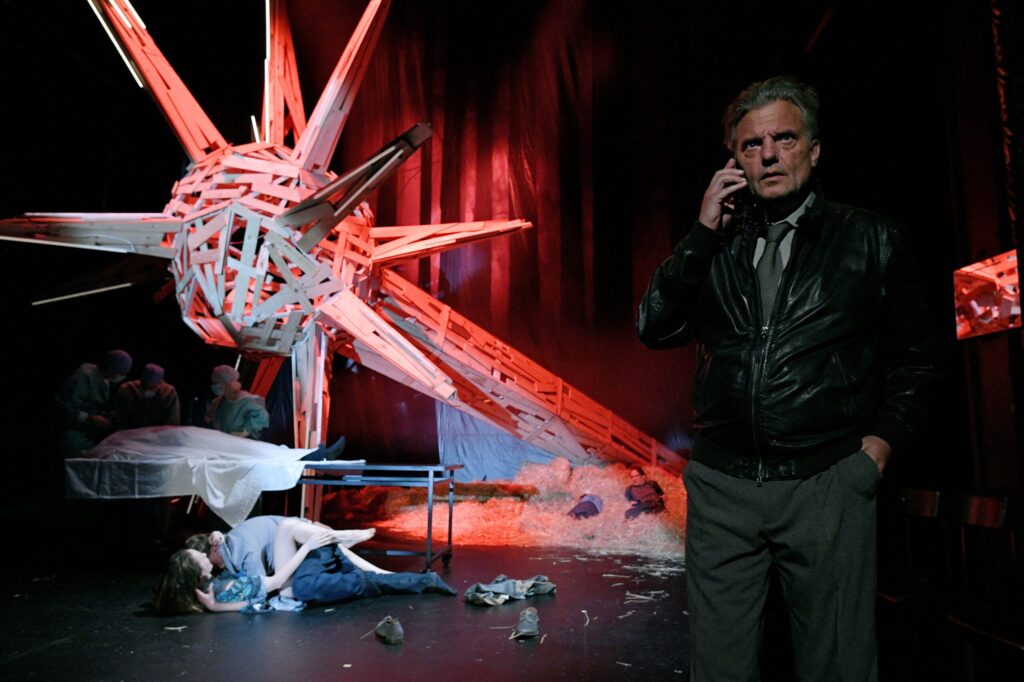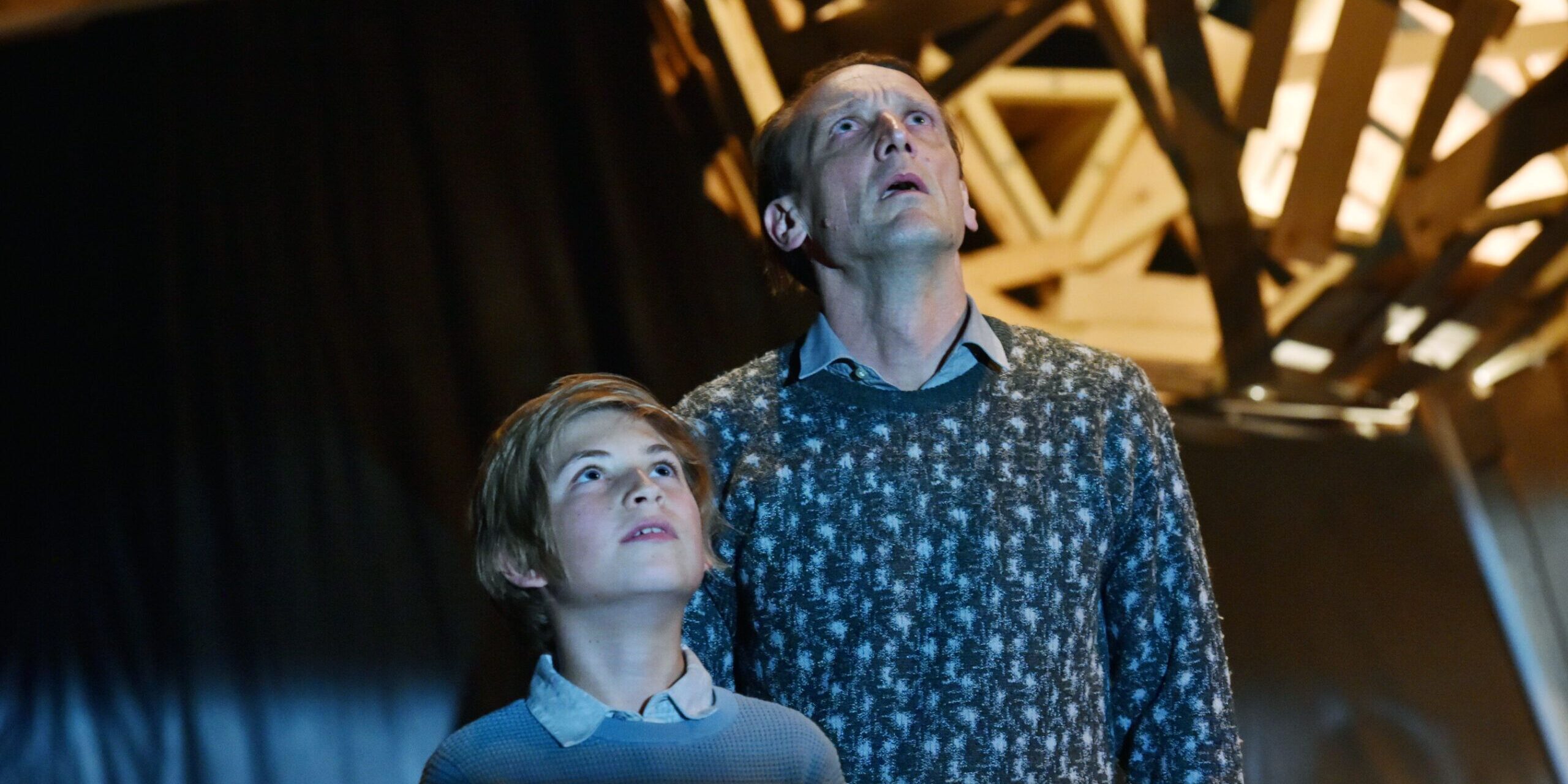SNG Drama Ljubljana, premiere 7th October 2023
Karl Ove Knausgård’s novel The Morning Star is not an easy work to adapt. The original novel is long and full of ornaments intended to make the world more realistic. It presents a complex and co-dependent world of which we are part of for only two autumn days. As a result, the dramatization of the novel, by Goran Vojnović, is dense, dynamic and full of colourful characters that are not one dimensional and are not there just to serve the story, but rather convoluted beings with individual motives and desires.
The production by director Ivica Buljan for SNG Drama Ljubljana is as dynamic and complex as the novel on which it is based. It has been staged with an enormous ensemble and simple, yet striking scenography by Aleksandar Denić. The set consists of an enormous wooden shooting star and a mobile table which sometimes serves as a chair or a car. Such a pragmatic approach leaves a lot of space and room for what is of utmost importance – the characters, their relationships and their dynamics, the connections between their lives; in such a world, a little moment or interaction can be greatly meaningful and change the entire trajectory of their relationships.
The timeline can sometimes seem confusing, but only momentarily. We come to understand that the acts have been written in a careful manner, by which the creators (or, as seems the more appropriate word at times: composers) preserve the audience’s attention. We are shown seemingly fragmented pieces of “separate” storylines which are short enough to not become long and drawn-out, yet also depict exact points in characters’ lives. With mostly witty, tight and rich interactions these moments keep us on the edge of our seats. And because the structure of the show quickly alternates between storylines, it gives us a perception that more time has passed, although events can happen in the same hour as the previous one. We are kept guessing but only until the cycle is ready to return us to the characters we previously observed.

Morning Star – SNG Drama Ljubljana. Photo: Peter Uhan
It might seem that there is a lot to handle in this over-three-hour show – a lot of names, background and context, – and this is sometimes true, as there are many points of view and motivations of which to perceive meaning, a lot of naturalistic, flawed, and wonderful characters played with great skill (too many to single out any one performance – every member of the cast shows a strong approach to the embodiment of their characters). The actors make us believe their characters so much that we feel immersed. It is almost like we know them, as they seem so real and their lives so similar to the people’s we know and care for, yet it is still displayed as a fantasy, a world where extreme situations arise all the time and where a magical star and mystery lives.
The creators of this adaptation remind us though, that there are some at first glance auto-fictional elements to the text and despite acts and characters not meant to be written to live in such a close universe to Knausgård, apparently all artists are incapable of removing themselves completely from their work (thankfully!). Tove (Petra Govc) is an artist showing many signs of psychosis. She is rapidly losing her contact with the outside world and acts by her own internal logic so much that it is almost impossible to communicate with her. Her partner Arne (Uroš Fürst) tries to take care of her, as well as their children, (who are generally depicted as glued to their phones and quite careless and self-centred; though children can often act this way, that is true, it feels too crude a depiction and one of the few negatives in this production). As Arne cannot handle his wife’s disorder, he makes a choice for an institution to take care of his wife while he focuses on their children. Not an easy choice, but he realises that he is depriving everyone in his life, mostly himself, of his care and attention. Maybe this depiction is not a perfect mirroring of Knausgård’s life, but the emotions and self-guilt-tripping are parallel to how he felt when his romantic relationship ended.
The chaotic order intensifies the immersive-ness and captures the transience of moments that we experience our whole lives. The symbol of a morning star is therefore a contrasting symbol of a transient idea. What deepens it, is a phenomenon of compelled death – one of the characters says it quite directly. The moment the megalomaniac morning star appears in the sky, even the people who should by all laws of physics die, just do not die. A seemingly fortunate consequence for many of our characters, as it gives them another chance to be close to somebody – may that be their children, lover, parent or really anyone – or to fight their fears and internal struggles once more. The parallel to a shooting star, that only appears for a few seconds, as are our lives, constructed of moments and interactions that only exist in the lives of others for a very limited amount of time. But the consequences also rob them of the ultimate end at which all problems, responsibilities and struggles should disappear. Yet their run from closing the final page is elongated and they never solve anything they were occupied with during our brief time together. In a way, the characters have no closure. And in a way, we do not either, as our unfinished yet not eternal run from everyday life is not finished as well.
Credits:
Director: Ivica Buljan// Adapted for the stage by: Goran Vojnović//Artistic advisor: Robert Waltl//Dramaturg: Mojca Kranjc//Set design: Aleksandar Denić//Ana Savić Gecan//Composer: Mitja Vrhovnik Smrekar
For tickets and further information, visit: Drama.si
Further reading: interview with Uroš Fürst: “Being an actor is like being a gladiator”
Živa Kadunc is a critic of contemporary performance art and a speaker on Radio Študent (Slovenia). She loves her plants.








